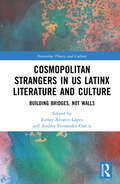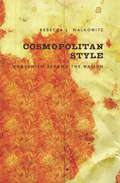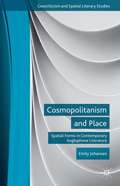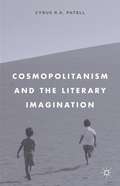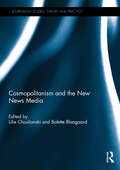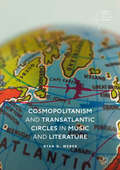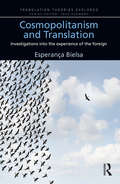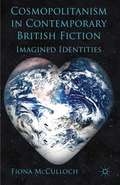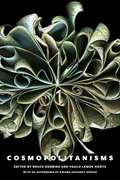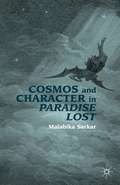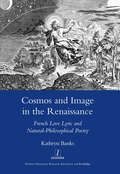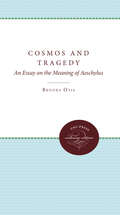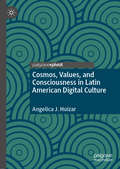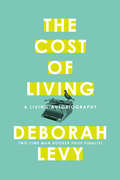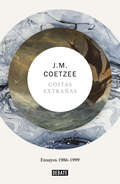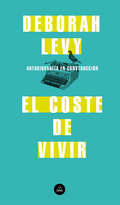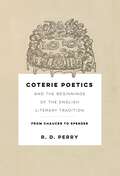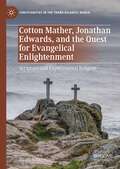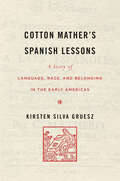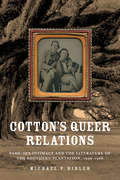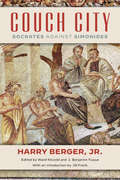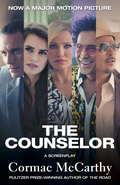- Table View
- List View
Cosmopolitan Strangers in US Latinx Literature and Culture: Building Bridges, Not Walls (Narrative Theory and Culture)
by Esther Álvarez-López Andrea Fernández-GarcíaThis book presents a study of the figure of the stranger in US Latinx literary and cultural forms, ranging from contemporary novels through essays to film and transborder art activism. The focus on this abject figure is twofold: first, to explore its potential to expose the processes of othering to which Latinxs are subjected; and, second, to foreground its epistemic response to neocolonial structures and beliefs. Thus, this book draws on relevant sociological literature on the stranger to unveil the political and social processes behind the recognition of Latinxs as ‘out of place.’ On the other hand, and most importantly, this volume follows the path of neo-cosmopolitan approaches to bring to the fore processes of interrelatedness, interaction, and conviviality that run counter to criminalizing discourses around Latinxs. Through an engagement with these theoretical tenets, the goal of this book is to showcase the role of the Latinx stranger as a cosmopolitan mediator that transforms walls into bridges.
Cosmopolitan Style: Modernism Beyond the Nation
by Walkowitz Rebecca L.In this broad-ranging and ambitious intervention in the debates over the politics, ethics, and aesthetics of cosmopolitanism, Rebecca L. Walkowitz argues that modernist literary style has been crucial to new ways of thinking and acting beyond the nation. While she focuses on modernist narrative, Walkowitz suggests that style conceived expansively as attitude, stance, posture, and consciousness helps to explain many other, nonliterary formations of cosmopolitanism in history, anthropology, sociology, transcultural studies, and media studies. Walkowitz shows that James Joyce, Joseph Conrad, Virginia Woolf, Salman Rushdie, Kazuo Ishiguro, and W. G. Sebald use the salient features of literary modernism in their novels to explore different versions of transnational thought, question moral and political norms, and renovate the meanings of national culture and international attachment. By deploying literary tactics of naturalness, triviality, evasion, mix-up, treason, and vertigo, these six authors promote ideas of democratic individualism on the one hand and collective projects of antifascism or anti-imperialism on the other. Joyce, Conrad, and Woolf made their most significant contribution to this "critical cosmopolitanism" in their reflection on the relationships between narrative and political ideas of progress, aesthetic and social demands for literalism, and sexual and conceptual decorousness. Specifically, Walkowitz considers Joyce's critique of British imperialism and Irish nativism; Conrad's understanding of the classification of foreigners; and Woolf's exploration of how colonizing policies rely on ideas of honor and masculinity. Rushdie, Ishiguro, and Sebald have revived efforts to question the definitions and uses of naturalness, argument, utility, attentiveness, reasonableness, and explicitness, but their novels also address a range of "new ethnicities" in late-twentieth-century Britain and the different internationalisms of contemporary life. They use modernist strategies to articulate dynamic conceptions of local and global affiliation, with Rushdie in particular adding playfulness and confusion to the politics of antiracism. In this unique and engaging study, Walkowitz shows how Joyce, Conrad, and Woolf developed a repertoire of narrative strategies at the beginning of the twentieth century that were transformed by Rushdie, Ishiguro, and Sebald at the end. Her book brings to the forefront the artful idiosyncrasies and political ambiguities of twentieth-century modernist fiction.
Cosmopolitan Style: Modernism Beyond the Nation
by Rebecca WalkowitzIn this broad-ranging and ambitious intervention in the debates over the politics, ethics, and aesthetics of cosmopolitanism, Rebecca L. Walkowitz argues that modernist literary style has been crucial to new ways of thinking and acting beyond the nation. While she focuses on modernist narrative, Walkowitz suggests that style conceived expansively as attitude, stance, posture, and consciousness helps to explain many other, nonliterary formations of cosmopolitanism in history, anthropology, sociology, transcultural studies, and media studies.Walkowitz shows that James Joyce, Joseph Conrad, Virginia Woolf, Salman Rushdie, Kazuo Ishiguro, and W. G. Sebald use the salient features of literary modernism in their novels to explore different versions of transnational thought, question moral and political norms, and renovate the meanings of national culture and international attachment. By deploying literary tactics of naturalness, triviality, evasion, mix-up, treason, and vertigo, these six authors promote ideas of democratic individualism on the one hand and collective projects of antifascism or anti-imperialism on the other. Joyce, Conrad, and Woolf made their most significant contribution to this "critical cosmopolitanism" in their reflection on the relationships between narrative and political ideas of progress, aesthetic and social demands for literalism, and sexual and conceptual decorousness. Specifically, Walkowitz considers Joyce's critique of British imperialism and Irish nativism; Conrad's understanding of the classification of foreigners; and Woolf's exploration of how colonizing policies rely on ideas of honor and masculinity. Rushdie, Ishiguro, and Sebald have revived efforts to question the definitions and uses of naturalness, argument, utility, attentiveness, reasonableness, and explicitness, but their novels also address a range of "new ethnicities" in late-twentieth-century Britain and the different internationalisms of contemporary life. They use modernist strategies to articulate dynamic conceptions of local and global affiliation, with Rushdie in particular adding playfulness and confusion to the politics of antiracism. In this unique and engaging study, Walkowitz shows how Joyce, Conrad, and Woolf developed a repertoire of narrative strategies at the beginning of the twentieth century that were transformed by Rushdie, Ishiguro, and Sebald at the end. Her book brings to the forefront the artful idiosyncrasies and political ambiguities of twentieth-century modernist fiction.
Cosmopolitanism and Place
by Emily JohansenCosmopolitanism and Place considers the way contemporary Anglophone fiction connects global identities with the experience in local places. Looking at fiction set in metropolises, regional cities, and rural communities, this book argues that the everyday experience of these places produces forms of wide connections that emphasize social justice.
Cosmopolitanism and the Literary Imagination
by Cyrus R. K. PatellThrough contemporary theories of cosmopolitanism and analyses of literary texts such as Heart of Darkness, Lilith's Brood, and Moby-Dick, this book explores the cosmopolitan impulses behind the literary imagination. Patell argues that cosmopolitanism regards human difference as an opportunity to be embraced rather than a problem to be solved.
Cosmopolitanism and the New News Media (ISSN)
by Lilie Chouliaraki Bolette BlaagaardThe Arab Spring, the Occupy Wall Street movement and the Haiti earthquake are only some of the recent examples of the power of new media to transform journalism. Some celebrate this power as a new cosmopolitanism that challenges the traditional boundaries of foreign reporting, yet others fear that the new media simply reproduce old power relations in new ways. It is this important controversy around the role of new media in shaping a cosmopolitan journalism that offers the starting point of this book. By bringing together an impressive range of leading theorists in the field of journalism and media studies, this collection insightfully explores how Twitter, Facebook, Flickr and YouTube are taking the voice of ordinary citizens into the forefront of mainstream journalism and how, in so doing, they give shape to new public conceptions of authenticity and solidarity. This collection is directed towards a readership of students and scholars in media and communications, digital and information studies, journalism, sociology as well as other social sciences that engage with the role of new media in shaping contemporary social life. This book was originally published as a special issue of Journalism Studies.
Cosmopolitanism and Transatlantic Circles in Music and Literature (Palgrave Studies In Music And Literature Ser.)
by Ryan R. WeberCosmopolitanism and Transatlantic Circles in Music and Literature traces the transatlantic networks that were constructed between a select group of composers, including Edvard Grieg, Edward MacDowell, and Percy Grainger, and the writers with whom they shared cosmopolitan affinities, including Arne Garborg, Hamlin Garland, Madison Grant, and Lathrop Stoddard. Each overlapping case study surveys the diachronic transmission of cosmopolitanism as well as the synchronic practices that animated these modernist ideas. Instead of taking a strictly chronological approach to organization, each chapter offers an examination of the different layers of identity that expanded and contracted in relation to a mutual interest in Nordic culture. From the burgeoning “universal” ambitions around 1900 to the darker racialized discourse of the 1920s, this study offers a critical analysis of both the idea and practice of cosmopolitanism in order to expose its common foundations as well as the limits of its application.
Cosmopolitanism and Translation: Investigations into the Experience of the Foreign (Translation Theories Explored)
by Esperanca BielsaSocial theories of the new cosmopolitanism have called attention to the central importance of translation, in areas such as global democracy, human rights and social movements, but translation studies has not engaged systematically with theories of cosmopolitanism. In Cosmopolitanism and Translation, Esperança Bielsa does just that by focussing on the lived experience of the cosmopolitan stranger, whether a traveller, migrant, refugee or homecomer. With reference to world literature, social theory and foreign news, she argues that this key figure of modernity has a central relevance in the cosmopolitanism debate. In nine chapters organised into four thematic sections, this book examines: theories and insights on "new cosmopolitanism" methodological cosmopolitanism translation as the experience of the foreign the notion of cosmopolitanism as openness to others living in translation and the question of the stranger. With detailed case studies centred on Bolaño, Adorno and Terzani and their work, Cosmopolitanism and Translation places translation at the heart of cosmopolitan theory and makes an essential contribution for students and researchers of both translation studies and social theory.
Cosmopolitanism in Contemporary British Fiction
by Fiona MccullochThis book is a concise and engaging analysis of contemporary literature viewed through the critical lens of cosmopolitan theory. It covers a wide spectrum of issues including globalisation, cosmopolitanism, nationhood, identity, philosophical nomadism, posthumanism, climate change, devolution and love.
Cosmopolitanisms
by Edited by Bruce Robbins and Paulo Lemos HortaAn indispensable collection that re-examines what it means to belong in the world. "Where are you from?" The word cosmopolitan was first used as a way of evading exactly this question, when Diogenes the Cynic declared himself a “kosmo-polites,” or citizen of the world. Cosmopolitanism displays two impulses—on the one hand, a detachment from one’s place of origin, while on the other, an assertion of membership in some larger, more compelling collective. Cosmopolitanisms works from the premise that there is more than one kind of cosmopolitanism, a plurality that insists cosmopolitanism can no longer stand as a single ideal against which all smaller loyalties and forms of belonging are judged. Rather, cosmopolitanism can be defined as one of many possible modes of life, thought, and sensibility that are produced when commitments and loyalties are multiple and overlapping. Featuring essays by major thinkers, including Homi Bhabha, Jean Bethke Elshtain, Thomas Bender, Leela Gandhi, Ato Quayson, and David Hollinger, among others, this collection asks what these plural cosmopolitanisms have in common, and how the cosmopolitanisms of the underprivileged might serve the ethical values and political causes that matter to their members. In addition to exploring the philosophy of Kant and the space of the city, this volume focuses on global justice, which asks what cosmopolitanism is good for, and on the global south, which has often been assumed to be an object of cosmopolitan scrutiny, not itself a source or origin of cosmopolitanism. This book gives a new meaning to belonging and its ground-breaking arguments call for deep and necessary discussion and discourse.
Cosmos And Character In Paradise Lost
by Malabika SarkarThis book offers a fresh contextual reading of Paradise Lost that suggests that a recovery of the vital intellectual ferment of the new science, magic, and alchemy of the seventeenth century reveals new and unexpected aspects of Milton's cosmos and chaos, and the characters of the angels and Adam and Eve. After examining the contextual references to cabalism, hermeticism, and science in the invocations and in the presentation of chaos and Night, the book focuses on the central stage of the epic action, Milton's unique cosmos, at once finite and infinite, with its re-orientation of compass points. While Milton relies on the new astronomy, optics and mechanics in configuring his cosmos, he draws upon alchemy to suggest that the imagined prelapsarian cosmos is the crucible within which vital re-orientations of authority could have taken place.
Cosmos and Image in the Renaissance: French Love Lyric and Natural-philosophical Poetry
by Kathryn BanksRenaissance images could be real as well as linguistic. Human beings were often believed to be an image of the cosmos, and the sun an image of God. Kathryn Banks explores the implications of this for poetic language and argues that linguistic images were a powerful tool for rethinking cosmic conceptions. She reassesses the role of natural-philosophical poetry in France, focusing upon its most well-known and widely-read exponent, Guillaume de Saluste Du Bartas.Through a sustained analysis of Maurice Sceve's Delie , Banks also rethinks love lyric's oft-noted use of the beloved as image of the poet. Cosmos and Image makes an original contribution to our understanding of Renaissance thinking about the cosmic, the human, and the divine. It also proposes a mode of reading other Renaissance texts, and reflects at length upon the relation of 'literature' to history, to the history of science, and to political turmoil.
Cosmos and Tragedy: An Essay on the Meaning of Aeschylus
by Brooks OtisOtis clarifies the moral and theological issues raised in the Ortesia and relates them to certain stylistic and structural qualities of the three plays. He tackles the central questions of guilt, retribution, and the relation between human and divine justice, and he sees a carefully prepared evolution in the trilogy from a primitive to a more civilized form of justice. Otis treats the trilogy as a poem, a play, and a work of theological and philosophical reflection.Originally published in 1981.A UNC Press Enduring Edition -- UNC Press Enduring Editions use the latest in digital technology to make available again books from our distinguished backlist that were previously out of print. These editions are published unaltered from the original, and are presented in affordable paperback formats, bringing readers both historical and cultural value.
Cosmos, Values, and Consciousness in Latin American Digital Culture
by Angelica J. HuizarThis book understands digital cultural production of electronic literatures and digital art by looking at electronic and digital works that produce subjective positionality, clouded knowledges of quantum theories, and metaphysical patterns grounded in a cultural ideology. This book underlines a conceptual framework for understanding how digital media impacts reading, approaching, and even interpreting social reality. The qualitative analyses interpret the current zeitgeist, and the works selected speak of the diverse, sometimes regionalized, and often multi-ethnic reality of the Latin American experience. The analyses elaborate on how artists reflect both the world they live in and a universal consciousness. These artists are not simply “digitalizing literature,” and these works are more than techy creations; rather, they make us think of other directions and connections.
The Cost of Living: A Working Autobiography
by Deborah LevyCrystalline, witty and audacious, The Cost of Living addresses itself to the dual experiences of writing and of womanhood, examining what is essential in each. Following the acclaimed Things I Don't Want to Know, which reflected deeply on the nature of gender politics and a life in letters, The Cost of Living returns to the same subject and to the same life, to find a writer in radical flux. If a woman dismantles her life, expands it and puts it back together in a new shape, how might she describe this new composition? "Words have to open the mind. When words close the mind you can be sure that someone has been reduced to nothingness." <p><p> In this elegiac second instalment of her "living autobiography", Deborah Levy considers what it means to live with value and meaning and pleasure. The Cost of Living is a vital and astonishing testimony, as distinctive, wide-ranging and original as Levy's acclaimed novels.
Costas extrañas: Ensayos 1986-1999
by J.M. CoetzeeUn apasionado recorrido por obras esenciales de la literatura universal y una invitación su lectura. Existen libros que remiten a otros libros, a otros autores e historias. Son obras de gran calado que invitan a continuar por la senda que trazan con sus reflexiones algunos maestros indiscutibles de la literatura y la crítica. Este es el caso de Costas extrañas, donde el premio Nobel J.M. Coetzee repasa con agudo conocimiento crítico y ternura hacia sus maestros tanto las novelas que le hicieron soñar como los personajes inolvidables que constituyen su memoria de escritor. Desde una reflexión sobre qué es un clásico hasta un estudio minucioso y brillante sobre la personalidad de Robinson Crusoe, el premio Nobel sudafricano recrea y analiza novelas o cuentos esenciales de autores como Kafka, Turgueniev, Dostoievski, Musil, Lessing, Brodsky, Borges o Rushdie, descubriendo aspectos hasta ahora desconocidos de su producción literaria. Gracias al lúcido sentido literario de Coetzee y a su penetrante capacidad de observación, este conjunto de ensayos podría definirse como la mejor aproximación a la lectura de la mano de uno de los más importantes escritores contemporáneos. «Costas extrañas es una fiesta de la inteligencia. Que una colección de notas de lectura se convierta en un libro tan brillante, tan oportuno, no deja de ser la confirmación de la grandeza de Coetzee.»JUAN BONILLA
El coste de vivir
by Deborah Levy¿Qué quiere decir ser libre como mujer o como artista? ¿Y cuál es el precio de esta libertad? Cosas que no quiero saber y El coste de vivir forman la «autobiografía en construcción» de Deborah Levy, un relato de la feminidad como libertad y no como castigo. Deborah Levy empieza a escribir este libro cuando, con cincuenta años, se ve forzada a reinventarse: su matrimonio ha terminado, sus ingresos escasean, su madre se está muriendo y sus hijas empiezan a abandonar el nido. En un momento en que la vida tendría que volverse plácida e imperturbable, Levy decide abrazar el caos y la inestabilidad a cambio de recuperar, oculto bajo capas y capas de resignación, un nombre propio. A través de un diálogo con intelectuales como Marguerite Duras o Simone de Beauvoir, y mediante recuerdos que evoca con elocuencia, sensibilidad y un delicioso sentido del humor, Levy se pregunta cuál esese papel ficticio escrito por hombres e interpretado por mujeres al que llamamos «feminidad». Cualquiera que haya luchado por ser libre y por construir una vida propia sabe que es precisamente eso: una lucha constante en la que se paga un coste por vivir. La crítica ha dicho...«Sabia, sutil e irónica. Cada frase de Levy es una obra de arte de claridad y elegancia. Una escritora brillante.»The Daily Telegraph «Una observadora astuta de lo mundano y lo inexplicable. Levy esboza detalles memorables en pocos trazos.»The New York Times Book Review «Un manifiesto para un estilo de vida arriesgado y radical, como seguir nadando cuando ya no haces pie.»The New Statesman «Levy, a sus cincuenta y largos, no escribe sobre su vida para su generación, sino para las que vienen.»Harper's Magazine «El coste de vivir es el precio que debe pagar una mujer para desmontar un hogar en el que ya no se siente como en casa. Para Levy, este acto radical da inicio a la búsqueda de una nueva vida que resulta inseparable de la búsqueda de una nueva narrativa.»The Times «Un manifiesto elocuente para lo que Levy llama "una nueva manera de vivir en el mundo post-familiar".»The Guardian «Esta mirada oportuna al modo en que las mujeres son vistas (y a menudo ignoradas) resonará entre muchos lectores.»Publishers Weekly «Bello, melancólico. El poder de las palabras para conceder vida tras la muerte y la importancia de escoger lo que sigue vivo entre lo que ha muerto están en el corazón de la exquisita prosa de Levy.»The Spectator «Extraordinario y bello. Extendiéndose amplia y profundamente sobre el matrimonio, la maternidad, el amor, la muerte y la amistad, esta obra está repleta de una inteligencia feroz, una humanidad generosa y unas ideas afiladas.»The FinancialTimes
Costume in the Comedies of Aristophanes
by Gwendolyn Compton-EngleThis book offers an interpretation of the handling of costume in the plays of the fifth-century comic poet Aristophanes. Drawing on both textual and material evidence from the fourth- and fifth-century Greek world, it examines three layers of costume: the bodysuit worn by the actors, the characters' clothes, and the additional layering of disguise. A chapter is also devoted to the inventive costumes of the comic chorus. Going beyond describing what costumes looked like, the book focuses instead on the dynamics of costume as it is manipulated by characters in the performance of plays. The book argues that costume is used competitively, as characters handle each other's costumes and poets vie for status using costume. This argument is informed by performance studies and by analyses of gender and the body.
Coterie Poetics and the Beginnings of the English Literary Tradition: From Chaucer to Spenser (The Middle Ages Series)
by R. D. PerryIn Coterie Poetics and the Beginnings of the English Literary Tradition, R. D. Perry reveals how poetic coteries formed and maintained the English literary tradition. Perry shows that, from Geoffrey Chaucer to Edmund Spenser, the poets who bridged the medieval and early modern periods created a profusion of coterie forms as they sought to navigate their relationships with their contemporaries and to the vernacular literary traditions that preceded them. Rather than defining coteries solely as historical communities of individuals sharing work, Perry reframes them as products of authors signaling associations with one another across time and space, in life and on the page. From Geoffrey Chaucer’s associations with both his fellow writers in London and with his geographically distant French contemporaries, to Thomas Hoccleve’s emphatic insistence that he was “aqweyntid” with Chaucer even after Chaucer’s death, to John Lydgate’s formations of “virtual coteries” of a wide range of individuals alive and dead who can only truly come together on the page, the book traces how writers formed the English literary tradition by signaling social connections.By forming coteries, both real and virtual, based on shared appreciation of a literary tradition, these authors redefine what should be valued in that tradition, shaping and reshaping it accordingly. Perry shows how our notion of the English literary tradition came to be and how it could be imagined otherwise.
A Cottage Garden Alphabet
by Andrea WisnewskiIn this vivid garden, where A is for Arbour and Z is for Zucchini, artist Andrea Wisnewski brings her talents to bear not only on flowers, shrubs, herbs, and fruit, but also on the resident fauna: bees and cats, children, dogs, and rabbits. The result is no static florilegium, but a witty and whimsical beehive of various and charming activity. In fact, there is hardly a letter without something happening.
Cotton Mather, Jonathan Edwards, and the Quest for Evangelical Enlightenment: Scripture and Experimental Religion (Christianities in the Trans-Atlantic World)
by Ryan P. HoseltonThis book explores the early evangelical quest for enlightenment by the Spirit and the Word. While the pursuit originated in the Protestant Reformation, it assumed new forms in the long eighteenth-century context of the early Enlightenment and transatlantic awakened Protestant reform. This work illuminates these transformations by focusing on the dynamic intersection of experimental philosophy and experimental religion in the biblical practices of early America’s most influential Protestant theologians, Cotton Mather (1663-1728) and Jonathan Edwards (1703-1758). As the first book-length project to treat Mather and Edwards together, this study makes an important contribution to the extensive scholarship on these figures, opening new perspectives on the continuities and complexities of colonial New England religion. It also provides new insights and interpretive interventions concerning the history of the Bible, early modern intellectual history, and evangelicalism’s complex relationship to the Enlightenment.
Cotton Mather’s Spanish Lessons: A Story of Language, Race, and Belonging in the Early Americas
by Kirsten Silva GrueszA sweeping history of linguistic and colonial encounter in the early Americas, anchored by the unlikely story of how Boston’s most famous Puritan came to write the first Spanish-language publication in the English New World.The Boston minister Cotton Mather was the first English colonial to refer to himself as an American. He was also the first to author a Spanish-language publication: La Fe del Christiano (The Faith of the Christian), a Protestant tract intended to evangelize readers across the Spanish Americas. Kirsten Silva Gruesz explores the conditions that produced La Fe del Christiano, from the intimate story of the “Spanish Indian” servants in Mather’s household, to the fragile business of printing and bookselling, to the fraught overlaps of race, ethnicity, and language that remain foundational to ideas of Latina/o/x belonging in the United States today.Mather’s Spanish project exemplifies New England’s entanglement within a partially Spanish Catholic, largely Indigenous New World. British Americans viewed Spanish not only as a set of linguistic practices, but also as the hallmark of a rival empire and a nascent racial-ethnic category. Guided by Mather’s tract, Gruesz explores English settlers’ turbulent contacts with the people they called “Spanish Indians,” as well as with Black and local native peoples. Tracing colonial encounters from Boston to Mexico, Florida, and the Caribbean, she argues that language learning was intimately tied with the formation of new peoples. Even as Spanish has become the de facto second language of the United States, the story of La Fe del Christiano remains timely and illuminating, locating the roots of latinidad in the colonial system of the early Americas.Cotton Mather’s Spanish Lessons reinvents our understanding of a key colonial intellectual, revealing notions about language and the construction of race that endure to this day.
Cotton's Queer Relations: Same-Sex Intimacy and the Literature of the Southern Plantation, 1936-1968 (American Literatures Initiatives Ser.)
by Michael P. BiblerFinally breaking through heterosexual clichés of flirtatious belles and cavaliers, sinister black rapists and lusty "Jezebels," Cotton's Queer Relations exposes the queer dynamics embedded in myths of the southern plantation. Focusing on works by Ernest J. Gaines, William Faulkner, Tennessee Williams, Lillian Hellman, Katherine Anne Porter, Margaret Walker, William Styron, and Arna Bontemps, Michael P. Bibler shows how each one uses figures of same-sex intimacy to suggest a more progressive alternative to the pervasive inequalities tied historically and symbolically to the South's most iconic institution.Bibler looks specifically at relationships between white men of the planter class, between plantation mistresses and black maids, and between black men, arguing that while the texts portray the plantation as a rigid hierarchy of differences, these queer relations privilege a notion of sexual sameness that joins the individuals as equals in a system where equality is rare indeed. Bibler reveals how these models of queer egalitarianism attempt to reconcile the plantation's regional legacies with national debates about equality and democracy, particularly during the eras of the New Deal, World War II, and the civil rights movement. Cotton's Queer Relations charts bold new territory in southern studies and queer studies alike, bringing together history and cultural theory to offer innovative readings of classic southern texts.
Couch City: Socrates against Simonides
by Harry BergerCrowning six decades of literary, rhetorical, and historical scholarship, Harry Berger, Jr., offers readers another trenchant reading. Berger subverts the usual interpretations of Plato’s kalos kagathos, showing Socrates to be trapped in a double ventriloquism, tethered to his interlocutors’ speech acts even as they are tethered to his. Plato’s Republic and Protagoras both reserve a small but significant place for a poet who differs from Homer and Hesiod: the lyric poet Simonides of Ceos. In the Protagoras, Socrates takes apart a poem attributed to Simonides and uses this to finish off the famous and supposedly dangerous sophist, Protagoras. Couch City is a close reading of the comic procedures Socrates deploys against Protagoras as he reduces him to silence. But it also shows that Socrates takes the danger posed by Protagoras and his fellow sophists seriously. Even if they are represented as buffoons, sophists are among the charismatic authority figures—poets, rhapsodes, seers, orators, and lawgivers—who promote views harmful to Athenian democracy. Socrates uses Simonides’s poem to show how sophists not only practice misinterpretation but are unable to defend against it. Berger ports his roots as a pioneering literary theorist into this rhetorical discussion, balancing ideas such as speech-act theory with hard-nosed philology. The result is a provocative and counterintuitive reassessment of Plato’s engagement with democracy.
The Counselor: A Screenplay (Vintage International)
by Cormac MccarthyOn the eve of becoming a married man, the Counselor makes a risky entrée into the drug trade--and gambles that the consequences won't catch up to him. Along the gritty terrain of the Texas-Mexico border, a respected and recently engaged lawyer throws his stakes into a cocaine trade worth millions. His hope is that it will be a one-time deal and that, afterward, he can settle into life with his beloved fiancée. But instead, the Counselor finds himself mired in a brutal and dangerous game--one that threatens to destroy everything and everyone he loves. Deft, shocking, and unforgettable, McCarthy is at his finest in this gripping tale about risk, consequence, and the treacherous balance between the two.
